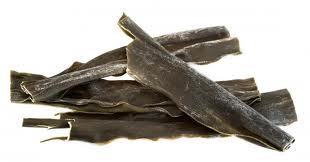 Kombu is a seaweed which comes from the waters near Japan and Korea. Grown on ropes, over 90% of world production comes from the coast of Japan. The first known reference to kombu can be traced to the 8th century, where it was used as a tax verification in the Tohoku region of Japan. While this is the first known reference to its use, it is widely believed to be known to Japan well before the 8th century. As a dried food, kombu is a traditional food used in Okinawan cuisine. Kombu became popular in the 1960s, when it was exported to countries such China and Korea. Today, you can find Kombu in most Asian specialty stores around the world.
Kombu is a seaweed which comes from the waters near Japan and Korea. Grown on ropes, over 90% of world production comes from the coast of Japan. The first known reference to kombu can be traced to the 8th century, where it was used as a tax verification in the Tohoku region of Japan. While this is the first known reference to its use, it is widely believed to be known to Japan well before the 8th century. As a dried food, kombu is a traditional food used in Okinawan cuisine. Kombu became popular in the 1960s, when it was exported to countries such China and Korea. Today, you can find Kombu in most Asian specialty stores around the world.
Key Nutrients
Kombu is high in protein and vitamins A and B1, and contains zinc, iron and calcium. Being algae, it is very high in dietary fiber while having a low amount of saturated fat.
Health Benefits
Vitamin B1 – Thiamine is an important vitamin since it breaks down sugars in the body. Thiamine also helps to support nerve and heart health.
Vitamin A – Vitamin A, when converted into retinaldehyde, is a vital compound for healthy eyes. Furthermore, vitamin A is believed to fight against cataracts, macular degeneration and glaucoma. Vitamin A strengthens the membranes of the human body such as mucous membranes, respiratory, urinary and intestinal tracts. It is also essential for the lymphocytes, or white blood cells, that fight infection once in the body.
Iron –Iron, found in red blood cells, is an integral part of hemoglobin. Hemoglobin carries oxygen from the lungs to the cells. Iron is an essential component of many enzymes necessary for various chemical reactions in the body.
Calcium – Calcium is an important mineral for bone and teeth growth and maintenance. It is also an important mineral in terms of cardiovascular function.
Zinc – The health benefits of Zinc include proper functioning of immune system, digestion, control of blood sugar and energy metabolism.
Season
Kombu is harvested from the sea in the fall, then dried in the sun, making it available year round.
Nutrition Information
Per 1 Tablespoon:
Calories (cKal): 20
Protein (grams): 2
Total Fat (grams): 0
Carbohydrates (grams): 2
Fiber (grams): 1
Buying and Storing
Kombu can be purchased in most supermarkets and Asian specialty markets. Store kombu in its packaging for up to six months. Once opened, store the dried seaweed in an air tight container of plastic zip lock bag for up to one month.
Best Way to Add to Diet
A great way to add kombu to your diet is by cutting into thin strips and adding to a soup or stew. When braising fish, nori can add a wonderful taste to a piece of salmon or mahi mahi.
Kombu Recipe

 Not Sure What Healthy Foods To Eat?
Not Sure What Healthy Foods To Eat? This week we take a look at one of my favorite healthy foods...the mighty Avocado.
This week we take a look at one of my favorite healthy foods...the mighty Avocado.
No comments yet.